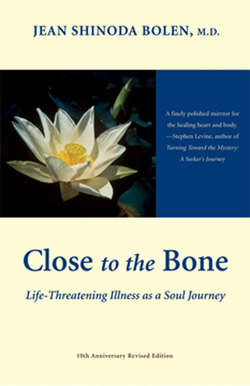Читать книгу Close to the Bone - Jean Shinoda Bolen - Страница 30
На сайте Литреса книга снята с продажи.
3
PSYCHE'S JOURNEY
ОглавлениеA serious illness takes us into a time which is both strange and scary for almost everyone. It is a life-changing, major event that brings the possibility of death or disability close to us. “Biting the bullet”—that western-frontier expression to do with submitting to surgery that absolutely must be done with no available anesthesia, and biting down rather than crying out—is now what is called for metaphorically. It means having the courage to face the reality or possibility of having an illness that may kill you. It means suffering pain that goes with the disease or the apprehension of it. It means enduring the treatment. What ails the body is at the immediate forefront, but attending to what ails the soul and is not right with our lives is often not far behind. Any serious medical condition—a heart attack, a bleeding ulcer, malignant hypertension, a malignancy— may have an impact on the psyche by cutting through layers of denial. An illness may confront us with what we know in our bones about being unhappy or self-destructive and have thus far disregarded or denied. Biting the bullet then applies to more than the medical problem; it's facing what is wrong with other aspects of our lives and what must be done. Once we face a medical truth and submit to what must be done to survive, barriers to other truths often come down as well. When this is so, it is a harbinger of change that will come next on the soul level.
When an illness is life-threatening, we can usually recognize how insignificant and unimportant many of our everyday concerns are. We may find that we are, for this time, free of neurotic preoccupations; what matters, for a change, may be what really matters. “Cancer can be an instant cure for neurosis” was how several women at a conference for breast cancer survivors put it.
At this same meeting, women who had made major changes in their lives as a result of a cancer diagnosis and were not just surviving the cancer but thriving remarked how their illness was “the worst thing that had ever happened to them and the best thing that had ever happened to them.” Men who were work driven, aggressive, and ambitious until they were felled by heart attacks, who slowed down and refocused, say the same thing. Usually these women and men took a good, long look at what was wrong in their lives and acted decisively to end what was bad for them—at the body and soul level—and moved toward what sustained and nourished them, also at the body and soul level.
It may be that they (finally) ended dysfunctional, soul-draining relationships with narcissistic, controlling, needy, abusive, or chronically angry people, who responded in their characteristically self-absorbed fashion to the news of the life-threatening illness. Or they (finally) stopped self-destructive additions to cigarettes, alcohol, or work. Usually, they (finally) acted on their own best behalf because they knew that their life depended upon it. In this, their ill-ness served as a wake-up call that enabled them to face what they had resisted.
